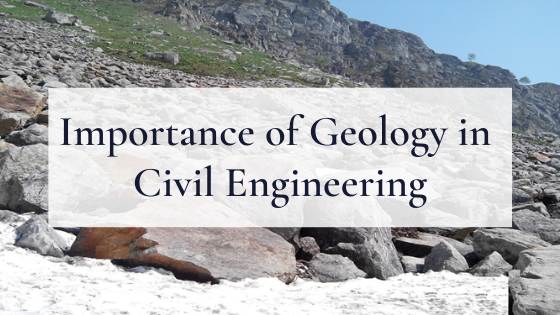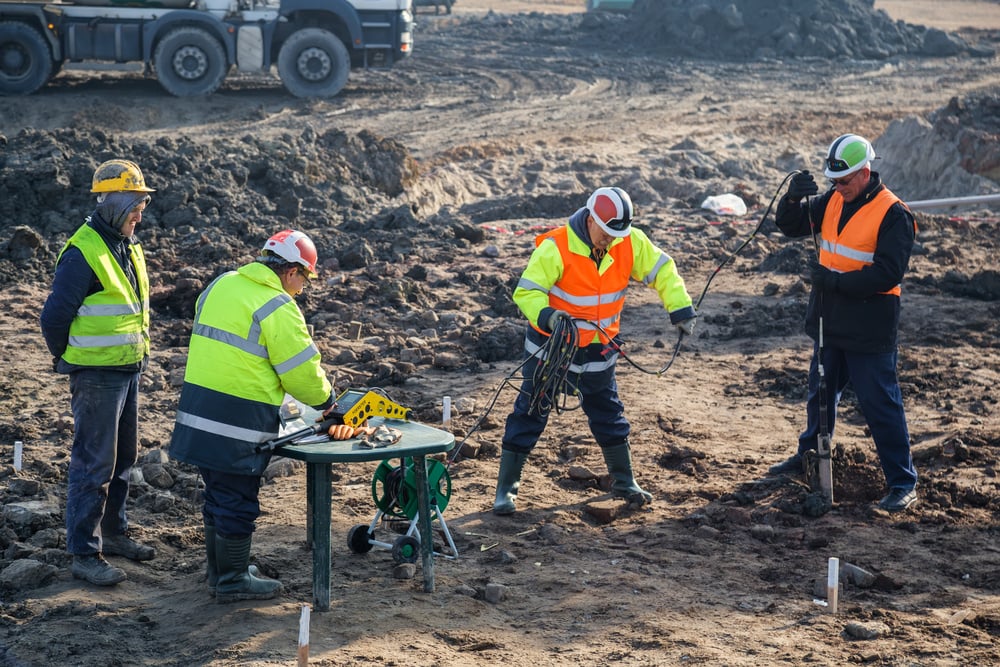Things about Specialized Geotechnical Engineering Solutions
5 Simple Techniques For Specialized Geotechnical Engineering Solutions
Table of ContentsEverything about Specialized Geotechnical Engineering SolutionsHow Specialized Geotechnical Engineering Solutions can Save You Time, Stress, and Money.Specialized Geotechnical Engineering Solutions Things To Know Before You BuyExcitement About Specialized Geotechnical Engineering Solutions
They conduct website examinations, accumulate examples, carry out laboratory examinations, and assess information to assess the viability of the ground for construction tasks. Based upon their findings, geotechnical designers provide referrals for foundation style, slope security, keeping structures, and reduction of geotechnical hazards. They collaborate with various other specialists, such as engineers, structural designers, and building teams, to make sure that geotechnical considerations are incorporated into the overall task style and execution.
Foundation Design: Geotechnical engineers play a vital function in making foundations that can safely support the designated structure. They evaluate the dirt problems and lots needs to establish the appropriate structure type, such as shallow foundations (e.g., grounds), deep structures (e.g., heaps), or specialized methods like soil renovation. They take into consideration factors such as negotiation limits, birthing ability, and soil-structure communication to create optimum foundation styles.
The 5-Minute Rule for Specialized Geotechnical Engineering Solutions
Here are some sorts of geotechnical engineers: Structure Designer: Foundation engineers focus on designing and evaluating structures for structures - Specialized Geotechnical Engineering Solutions. They analyze the soil conditions, lots demands, and website characteristics to figure out the most proper foundation kind and layout, such as shallow foundations, deep structures, or specialized methods like heap structures
They execute field testing, accumulate examples, and evaluate the collected data to identify the dirt homes, geologic formations, and groundwater conditions at a website. Geotechnical Instrumentation Designer: Geotechnical instrumentation engineers focus on surveillance and gauging the actions of dirt, rock, and structures. They install and keep instrumentation systems that monitor variables such as dirt negotiation, groundwater levels, slope movements, and architectural displacements to analyze efficiency and offer early warnings of potential problems.
In the workplace environment, geotechnical designers use specialized software program devices to perform calculations, create styles, and assess data. Specialized Geotechnical Engineering Solutions. They prepare reports, evaluation task requirements, communicate with clients and employee, and coordinate project tasks. The office setup provides a conducive environment for research, analysis, and collaboration with various other professionals involved in the task
They often go to job websites to conduct website investigations, assess geotechnical conditions, and collect information for evaluation. These brows through involve traveling to different places, occasionally in remote or tough surfaces. Geotechnical designers may perform soil sampling, conduct examinations, and screen building activities to guarantee that the geotechnical elements of the job are being applied correctly.
An Unbiased View of Specialized Geotechnical Engineering Solutions
Geotechnical designers also operate in specialized geotechnical labs. In these facilities, they carry out experiments, do examinations on soil and rock samples, and analyze why not try this out the engineering residential properties of the products. Geotechnical lab engineers function thoroughly in these environments, taking care of screening tools, operating instruments, and recording data. They work together with other laboratory personnel to make sure accurate and reputable screening results.
Preserving Walls: Developing wall surfaces that keep back soil to stop landslides and supply security on sloped surfaces. Embankments and Earthworks: Creating embankments for roadways, railways, and dams to ensure they remain steady under anxiety. The mining sector counts greatly on geotechnical design to guarantee the safety and longevity of its operations.
With this in mind, we have created our program to prepare pupils for success. The Geotechnical Design program at the University of Delaware supplies opportunities for sophisticated study and research in: Soil and rock technicians Bonuses Soil-structure communication Integral modeling Computational geomechanics Foundation and earth frameworks design Ground improvement Slope security and landslide stabilization next Liquefaction of dirts and quake engineering Research laboratory characterization of geomaterials and soil support Ecological geotechnics Provided the strong need for enhancement to our nation's infrastructurethe American Culture of Civil Designers provided the U.S.
Geotechnical design is a branch of civil design; nevertheless, it involves making use of clinical approaches and concepts to gather and analyze the physical buildings of the ground. Geotechnical designers are associated with all stages of the design of structures, from idea to construction. Their work is necessary in the design and preparation process as they examine the integrity of soil, clay, silt, sand, and rock, prior to building and construction starting.
All about Specialized Geotechnical Engineering Solutions
This is adhered to by a ground investigation based upon the searchings for of the workdesk research study and entails test matching and sampling to uncover any type of potential problems. Geotechnical designers work within multidisciplinary groups, sustained by intermediate and jr engineers along with by CAD technicians. As an elderly geotechnical designer on a hydro plant job, jobs might include participating in technological testimonials (e.g., peer evaluations), tailings clog inspections, dam safety reviews, and other research studies connected to the design and construction of mine waste facilities.
While some specialists specialise solely in geotechnics, others may work under titles like engineering geologist or ground designer within comparable abilities. As a geotechnical designer, you'll require to: construct and keep relationships with clients and other specialists associated with the site, throughout each projectmaintain safety standards on site bear in mind price implications when you make recommendationsstudy geological maps and aerial pictures from a range of resources and from different time periodsexamine construction prepares to see how practical they are based upon your understanding of the siteinvestigate dangers or geological risks for the sitesearch for eco delicate functions, such as land fill beginning to establish factual and expository ground modelsplan field investigationsdrill and analyse examples of bedrock, dirt, groundwater and extra products manage other professionals on sitesolve technological concerns as they develop, such as unexpected structures at drill sitesmonitor problems throughout and after construction to make sure frameworks are stable in the brief and long termadd information collected on site to your preliminary researchcreate geotechnical calculations, illustrations, and 2 or three-dimensional computer system designs analyzing the datamake recommendations regarding the suggested use the website.
There are great deals of opportunities to satisfy brand-new people, as you'll deal with a range of experts at every website. The work can be difficult as you may be accountable for the safety of others while on site. There is also a high level of monetary obligation, as the recommendations you make can have severe price implications.
